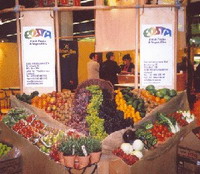European market open to free trade
European Union will keep Europe open to free trade on condition that others will do the same and combat counterfeiting - a clear swipe at China.

Ending a one-day summit, the 27 EU leaders also called for international efforts to limit the fallout from a banking crisis that looks set to brake economic growth in the EU next year.
Openness to the world also means "managing legal migration for high-skilled workers" while being tough on illegal migrants and human trafficking, said European Commission President Jose Manuel Barroso.
"We believe that if we manage this well, everyone can benefit ... Europe and the migrants," he told reporters.
The EU leaders said staying open to the rest of the world had its limits.
"Our partners must also demonstrate openness on the basis of internationally agreed rules, in particular as concerns fair competition and the protection of intellectual property rights," they said in a joint declaration.
China has run into trouble on both those fronts.
The Europeans complain they face too many barriers to doing business in the world's most populous nation and that Beijing does too little to stop the counterfeiting of products developed in Europe.
Already in the first eight months of this year, China's yawning trade gap with the EU grew by 20 percent, helped by the low level of the yuan against the dollar and the euro.
The EU leaders had little to say about the global financial crisis that makes banks wary of lending money, which has hurt the wider economy because it is harder for people to get home loans and for businesses to secure credit. The global crisis stems from banks making investments based on U.S. housing loans that were far riskier than rated.
The leaders called for work to improve prudent frameworks and financial market transparency.
"Europe is conscious of the need we have to increase and strengthen financial stability," British Prime Minister Gordon Brown said.
Inflation in the 13 EU nations that use the euro surged Friday to the highest level since the currency came into circulation in 2002, hitting 3.1 percent in November as energy and food prices soared.
The European Central Bank is under pressure to keep interest rates low - instead of raising borrowing costs to cool an overheating economy - to encourage banks to keep lending money to each other. It is being forced to pump more money into markets to keep them liquid.
A growth spurt that started last year saw Europe's exports to the rest of the world charge ahead and encourage European consumers to start spending again after several years of sluggish growth, while price increases and pay demands stayed moderate.
That situation is now overshadowed by worries over how long it will take for financial markets to bounce back and how far it could force the U.S. economy to slow, in turn hurting Europe, its largest trading partner.
The European Commission has downgraded a bright forecast for economic growth next year and the EU's economy chief acknowledged earlier this month that the 13 euro nations may slow even further to only 2 percent as the region also copes with a strong currency and high oil prices.
Subscribe to Pravda.Ru Telegram channel, Facebook, RSS!


